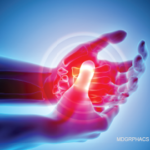 ACR Convergence 2021—Treating patients with rheumatoid arthritis (RA) is something most rheumatologists would consider bread-and-butter medicine. However, despite the frequency with which the condition is encountered in clinical practice, the management of patients with this disease can be far from simple. Bryant England, MD, PhD, an assistant professor of internal medicine in the Division of Rheumatology, University of Nebraska Medical Center (UNMC) and a rheumatologist for the VA Nebraska-Western Iowa Health Care System, provided an update on the state of RA management in the annual Review Course during ACR Convergence 2021.
ACR Convergence 2021—Treating patients with rheumatoid arthritis (RA) is something most rheumatologists would consider bread-and-butter medicine. However, despite the frequency with which the condition is encountered in clinical practice, the management of patients with this disease can be far from simple. Bryant England, MD, PhD, an assistant professor of internal medicine in the Division of Rheumatology, University of Nebraska Medical Center (UNMC) and a rheumatologist for the VA Nebraska-Western Iowa Health Care System, provided an update on the state of RA management in the annual Review Course during ACR Convergence 2021.
Optimize Methotrexate Use
Dr. England explained that although methotrexate has been around for decades, its use is often not optimized. Using the 2021 ACR Guideline for the Treatment of Rheumatoid Arthritis as his main point of reference, Dr. England noted that oral methotrexate can reasonably be started at 15 mg weekly—or dosing can be titrated up to that amount four to six weeks after starting the medication.1 Side effects can be managed by split dosing, subcutaneous rather than oral administration and increased intake of folic acid.
If oral methotrexate is tolerated but not optimally effective, clinicians should consider switching to the subcutaneous formulation prior to adding another disease-modifying anti-rheumatic drug (DMARD) or switching to an alternative DMARD.
Methotrexate remains an extremely important therapeutic for patients with RA because about 30% of patients with RA in clinical trials reach low disease activity on methotrexate monotherapy, Dr. England explained.
When contemplating tapering DMARD therapy for patients, Dr. England stated that flares will likely occur, & patients must be monitored & restarted on effective therapies in such circumstances.
With respect to methotrexate dose titration, Jain et al. conducted a multicenter, open-label (assessor blinded) randomized clinical trial in which 178 patients with active RA (mean DAS28-CRP of 5.4) were randomized to either usual or fast escalation of methotrexate dose from 15 mg per week to a maximum of 25 mg per week.2 At 16 weeks and 24 weeks of follow-up, essentially no differences in clinical response to treatment were observed, nor were significant differences observed in cytopenias, transaminitis or drug discontinuation/dose reduction between the usual and fast escalation groups.
These results indicate that it is reasonable and safe to guide patients through uptitration of methotrexate doses, even at a quick pace, to reach levels that provide significant clinical benefit.
Glucocorticoids
Dr. England noted the 2021 guideline conditionally recommends not using short-term glucocorticoids (i.e., fewer than three months) at the time of initiation of DMARDs in patients with moderate to high RA disease activity.1 Although glucocorticoids may still play a role in the management of RA, a better appreciation of the potential risks associated even with low-dose therapy has prompted clinicians to avoid using these medications by default.

